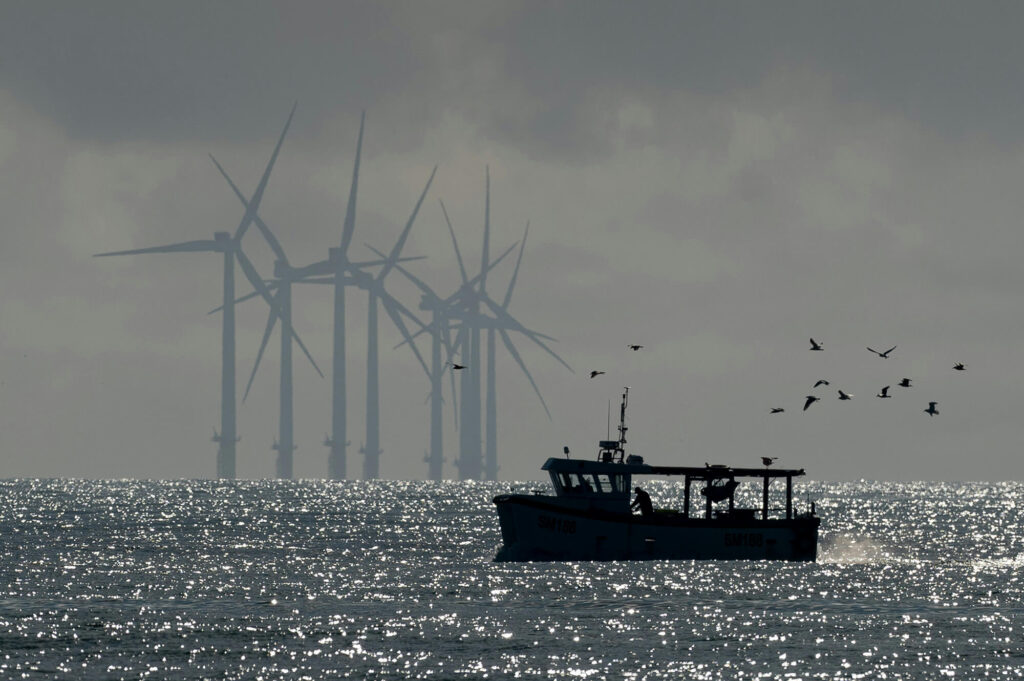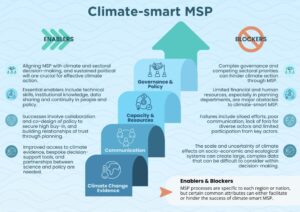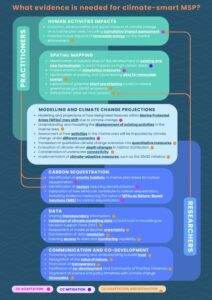Story
Accelerating climate action through marine spatial planning: the opportunity lies ahead
23 May 2025
A new PML-led study identifies key enablers to implementing climate-smart Marine Spatial Planning.

An international team of researchers and marine planning practitioners have published new research demonstrating how Marine Spatial Planning (MSP) can be leveraged to advance climate change adaptation and mitigation in the Ocean, through the identification of enablers and blockers in practices around the world.
Led by PML’s Professor Ana Queirós, the new study “The opportunity for climate action through climate-smart Marine Spatial Planning” emerges from discussions by the International Council for Exploration of the Sea (ICES) Working Group on Marine Planning and Coastal Zone Management, and brings together perspectives from marine scientists, climate experts, and MSP practitioners, investigating the reasons for the slow adoption of climate-smart MSP (CSMSP) and sharing operational examples on how CSMSP is working around the world.
A critical tool for managing ocean resources, Marine Spatial Planning (MSP) operates much like city planning for the sea. This process is designed to analyse and help allocate marine spaces to balance ecological protection, economic development, and social needs while navigating complex political frameworks.
However, marine spatial plans usually only capture a snapshot of current activities and many do not consider future changes due to climate change (e.g. ocean warming, acidification, deoxygenation, extreme events, changes in productivity and salinity, and ocean circulation patterns) and the potential effects on the sustainability of human activities in the ocean as well as ocean wildlife, and important services delivered by the Ocean, such as climate regulation.
The new paper highlights that integrating climate change into Marine Spatial Planning can be enabled by a number of factors, including:
- Climate change evidence: Improved access to climate evidence, bespoke decision-support tools, and deeper partnerships between science and policy are needed.
- Communication: Successes involve collaboration and co-design of policy to secure high buy-in and building relationships of trust, including Indigenous Peoples and local communities.
- Capacity and resources: Essential enablers include technical skills, institutional knowledge, data sharing and continuity in people and policy.
- Governance and policy: Aligning MSP with climate and sectorial decision-making and sustainable political will are crucial for effective climate action.
Enablers and blockers of climate-smart Marine Spatial Planning (MSP)
The study also explores the major opportunities that exist to transform how the Ocean can be better managed for climate action. Several successful examples of climate action through MSP from around the world are highlighted including:
- Germany’s designation of priority areas for offshore wind in their North Sea and Baltic Sea plans
- Ireland’s spatial advice on protecting seafloor areas with naturally high carbon uptake
- The Netherlands’ strategic regulation of sand extraction to protect coastal areas from sea level rise
- The Seychelles’ analysis of sea surface temperatures to identify climate refuges in their zoning plans.
The study also highlights that the potential for CSMSP extends far beyond national waters, offering a framework for international cooperation that can guide climate action across the 60% of ocean space in Areas Beyond National Jurisdiction (ABNJ).
Going forward, wider progress requires the strengthening of research-policy coordination, developing powerful decision-support tools that build stakeholder trust in climate evidence, securing adequate resources for comprehensive climate integration, and aligning MSP with broader climate policies for both mitigation and adaptation.
Professor Ana Queirós, study lead and Marine and Climate Change Ecologist at Plymouth Marine Laboratory, said:
“Marine Spatial Planning (or Marine Planning) isn’t just about managing ocean space – it’s about unlocking a powerful tool for climate action that can unite competing interests under a common cause.”
“Climate change itself creates opportunities to reimagine ocean use, as shifting species and habitats require adaptive management that can reset sectoral conflicts and promote multi-use maritime spaces designed for future resilience. Success requires robust monitoring systems with indicators that track both climate and sectoral objectives, providing the foundation for international agreements on climate-smart MSP delivery and ensuring plans effectively contribute to broader climate goals beyond their immediate scope.”
“By bringing together everyone from local fishing communities, NGOs, to international policy makers, MSP can transform what were once seen as impossible trade-offs between renewable energy and biodiversity into win-win solutions. Climate change is forcing us to rethink how we use our oceans anyway – it’s imperative that we seek to manage marine spaces in a way that serves multiple purposes while building resilience for the future”.
Caitriona Nic Aonghusa, co-author and Section Manager for Marine Spatial Planning and Marine Strategy Framework Directives Policy Support and Coordination at the Marine Institute (Ireland), commented:
“This research brought together a unique blend of marine planners, policy makers and climate researchers, to explore how climate change can be addressed through established marine spatial planning (MSP) processes. It was the culmination of 4 years of dialogue initiated by the ICES Working Group on Marine Planning and Coastal Zone Management (WGMPCZM).”
“Marine Planning provides a systemic mechanism for addressing climate change. It is a forward-looking process, balancing development needs with environmental protection, that serves as a framework to align ocean use with national climate action plans.”
“By integrating climate data and projections into the marine planning evidence base, it can be used to inform offshore renewable energy development, coastal resilience and protect carbon-rich habitats, like seagrasses. It can ensure that marine activities remain resilient to sea-level rise, ocean warming, and acidification”.
What evidence is needed to support climate-smart Marine Spatial Planning (MSP)?
The researchers call for better cohesion between legislation governing MSP and climate change policy, improved monitoring frameworks to track climate action through MSP, and greater international coordination as species and habitats move across national boundaries in response to climate change.
Related information
Full paper: The opportunity for climate action through climate-smart Marine Spatial Planning | npj Ocean Sustainability


